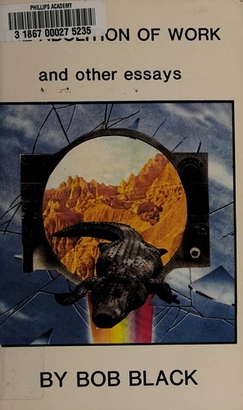Top Qs
Timeline
Chat
Perspective
The Abolition of Work
1985 essay by Bob Black From Wikipedia, the free encyclopedia
Remove ads
"The Abolition of Work" is an essay written by Bob Black in 1985. It was part of Black's first book, an anthology of essays entitled The Abolition of Work and Other Essays published by Loompanics Unlimited.[1] It is an exposition of Black's "type 3 anarchism" – a blend of post-Situationist theory and individualist anarchism – focusing on a critique of the work ethic.[2]
Remove ads
Synopsis
Summarize
Perspective
In the essay, Black advocates against work, and for play. He opens the essay with the sentence "No one should ever work". Black defines work as "compulsory production" enforced by "economic or political means", which he critizes both in capitalist and communist economic systems. Black does not argue for idleness, but for "a new way of life based on play".[1] According to him, work is the source of the misery in the world. He considers the modern American worker of his time as a "part-time slave", in a hierarchy comparable to a monastery or prison.
Black claims that work can largely be abolished, since most of it is useless except for those in power. According to him, the useful work that then remains after the abolition could be transformed into playing games, "indistinguishable from other pleasurable pastimes, except that they happen to yield useful end-products".
The essay is humoristic in tone and could be considered satirical, although Black writes that he is "both joking and serious". Reverend Ivan Stang writes in the foreword of the collection that Black wrote some of the "wittiest hate humor I'd ever seen". Black, for example, compares the modern American worker to the Cambodian genocide, writing: "People think the Cambodians were crazy for exterminating themselves, but are we any different?"

Remove ads
Influence
"The Abolition of Work" was a significant influence on futurist and design critic Bruce Sterling, who at the time was a leading cyberpunk science fiction author and called it "one of the seminal underground documents of the 1980s".[3] The essay's critique of work formed the basis for the anti-labor faction in Sterling's 1988 novel Islands in the Net.[3]
The book has been cited and referred to during the anti-work movement of the 2020s, particularly active on Reddit.[4]
Remove ads
See also
References
Further reading
External links
Wikiwand - on
Seamless Wikipedia browsing. On steroids.
Remove ads

